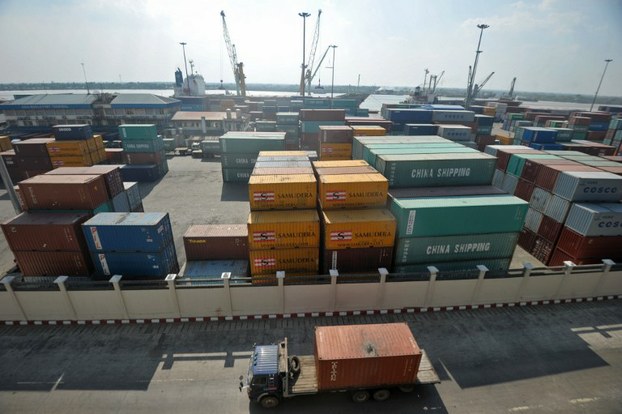U.S. eases sanctions against Myanmar
| Publisher | Radio Free Asia |
| Publication Date | 17 May 2016 |
| Cite as | Radio Free Asia, U.S. eases sanctions against Myanmar, 17 May 2016, available at: http://www.refworld.org/docid/5760fbecc.html [accessed 23 January 2017] |
| Disclaimer | This is not a UNHCR publication. UNHCR is not responsible for, nor does it necessarily endorse, its content. Any views expressed are solely those of the author or publisher and do not necessarily reflect those of UNHCR, the United Nations or its Member States. |
2016-05-17
By Roseanne Gerin
 A truck drives past a cargo container yard at a port in Yangon, March 2, 2015. AFP
A truck drives past a cargo container yard at a port in Yangon, March 2, 2015. AFP
The United States has eased some sanctions against Myanmar to promote the Southeast Asian nation's economic growth and political reform under the new pro-democracy government that came to power in April, the Treasury Department announced on Tuesday.
The Treasury Department also removed seven state-owned enterprises and three state-owned banks, including Myanma Economic Bank, Myanmar Foreign Trade Bank, and Myanma Investment and Commercial Bank, from its official blacklist.
The U.S. also extended a measure to allow shipments to go through ports and airports in Myanmar, also known as Burma.
The U.S. hopes the move will open up opportunities for trade and for more American companies to invest in Myanmar.
"Our actions today demonstrate our strong support for this political and economic progress while continuing to pressure designated persons in Burma to change their behavior," Adam Szubin, acting under secretary for terrorism and financial intelligence, said in a statement.
"These steps will help to facilitate trade with non-sanctioned businesses and, in turn, help the people and government of Burma achieve a more inclusive and prosperous future," he said.
The U.S., however, is keeping in place restrictions on trade and investment by Myanmar's powerful military, which ruled the country for a half-century until 2011 when the army-backed Union Solidarity and Development Party (USDP) came into power.
It is also maintaining restrictions on individuals and firms because of their ties to human rights abuses and military trade with North Korea under the military regime.
The new government under President Htin Kyaw and State Counselor Aung San Suu Kyi came to power a nearly two months ago after her National League for Democracy (NLD) party swept national elections last November.
Last December, the U.S. temporarily lifted a ban on trade through Myanmar's ports following the election.
The U.S. previously dropped most trade restrictions against Myanmar after former President Thein Sein's quasi-civilian government undertook political and economic reforms beginning in 2011, but an embargo remained on several business interests of the junta-era elite, including several key export and import sites.
U.S. Secretary of State John Kerry will meet with Myanmar leaders on May 22 in the administrative capital Naypyitaw in a sign of U.S. support for the new government and further democratic and economic reforms.
Link to original story on RFA website
